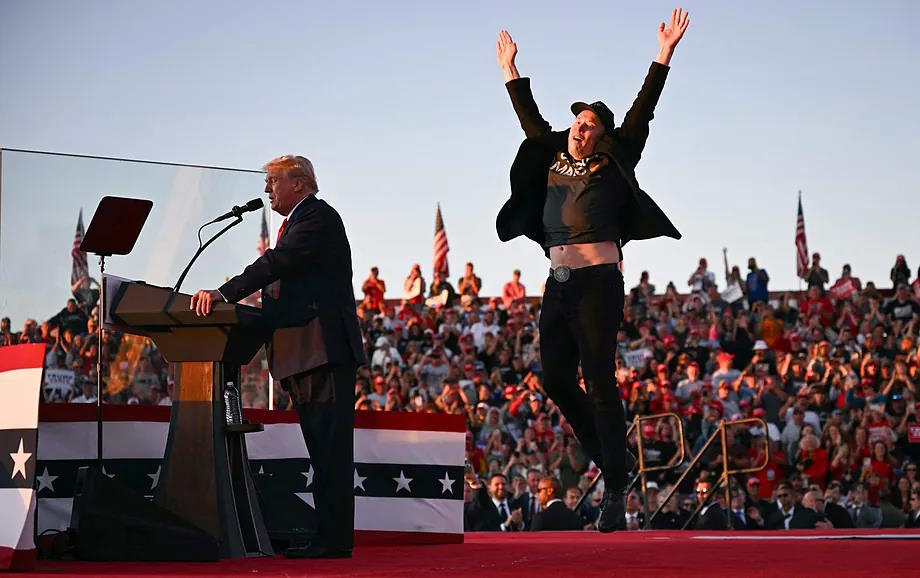It was one of the most talked-about, anticipated, controversial appointments, and it has finally happened, more or less. Elon Musk, the richest man in the world, an increasingly close advisor to Donald Trump, and campaign companion (he invested nearly $200 million from his own pocket and was present at rallies or on election night at Mar-a-Lago) will lead the "government efficiency department," something that despite its name and grand appearance will not be a department or part of the government, but could have far-reaching effects on the future of public administration.
"This will cause a ripple effect in the system and all those involved in government waste, which are many people," Musk celebrated in a statement.
Weeks ago, Trump hinted that the businessman would have some kind of responsibility if he won the elections, some kind of power to conduct a thorough audit of the efficiency of public administration, which according to his calculations spends $6.5 trillion each year. And this Tuesday, amid a battery of very important appointments (Secretary of Defense, National Security Advisor, White House lawyer, or CIA director, among others), Trump has provided more details on what he has described as "potentially the Manhattan Project of our era," but clarifying that whatever Musk does will not be from within the Executive, but from the outside.
In a statement, the president-elect explained that the owner of Tesla, X, or SpaceX, and former Republican presidential candidate Vivek Ramaswamy, who challenged Trump in the Republican primaries and then joined his movement, will lead the Department of Government Efficiency (DOGE in its English acronym), which despite its name does not imply a public position, but rather a kind of external consultancy.
Ramaswamy suspended his campaign in January and went on to offer his support to Trump. He is a biotechnology billionaire, as reported by the BBC, with no previous experience in political positions. During his campaign as a Republican candidate, he proposed the elimination of several federal departments, such as Education, the Nuclear Regulatory Commission, the Internal Revenue Service, and the FBI. He also made statements such as "faith, patriotism, and hard work" being replaced by "new secular religions like covid-ism climate and gender ideology." And regarding Ukraine, he asked Kiev for "major concessions" to end the conflict.
As explained, both will work together to "dismantle government bureaucracy, eliminate excessive regulations, cut unnecessary expenses, and restructure federal agencies." This, he promises, will "free the economy" and end current "massive waste and fraud."
The idea is not original. In 1982, Ronald Reagan did the same, commissioning businessman Peter Grace to conduct an external evaluation of public spending. His report, known as the Grace Commission, concluded with savings suggestions estimated at up to $424 billion in three years, preventing the skyrocketing increase of public debt.
The two businessmen will provide "advice and guidance from outside the government, and will partner with the White House and the Office of Management and Budget to drive large-scale structural reform and create a business approach to government never seen before." The audit work should be completed "no later than July 4, 2026," the date on which the USA will celebrate its 250th anniversary.
There are many reasons why Musk should not be an official part of the government, most of them related to incompatibilities. But the same rule applies to a task that will most likely clash with all US conflict of interest rules. Musk has contracts worth billions of dollars with the government, especially concerning his space and rocket business. Additionally, he has conflicts with numerous federal agencies, from those overseeing environmental damage and pollution from his rockets to the Department of Labor, passing through vehicle safety without drivers. In recent months, more than 20 investigations have been opened.
According to estimates from The New York Times a few weeks ago, "SpaceX practically dictates the launch schedule of NASA's rockets. The Department of Defense depends on it to put most of its satellites into orbit, and last year, his companies were promised $3 billion in almost 100 different contracts with 17 federal agencies."
"We have a fourth branch of government, the administrative state, that our Founding Fathers did not imagine," Ramaswamy, a former pharmaceutical executive, said in an interview yesterday. "Eliminating excess bureaucracy will be good for our economy and our national spirit."
The world's richest man said before the elections that he would help Trump cut $2 trillion from the federal budget (more than the Departments of Defense, Education, and Homeland Security combined), but for now, there is no plan or details on how they will do it, or which parts of the government would be cut or restructured. There is also no clarity on the potential impact of such external consultancy, as federal spending is controlled by Congress and not just the White House. And although Republicans have regained control of the Senate and are on track to retain the House of Representatives, any adjustment requires the support of politicians who are accountable to their constituencies and have always been very careful with every dollar spent on them.
The second issue is about the agencies themselves and allowing the wolf to guard the sheep. It is not a conspiracy. Musk has publicly complained repeatedly about the limitations imposed by legislation, all of them. Those that require permits to discharge large amounts of potentially contaminated water from his rocket launch pad in Texas. About the Federal Communications Commission, which oversees the satellites launched by SpaceX, saying that if it had not "illegally revoked" more than $886 million in federal funds that the company had requested to provide Internet access to rural areas, the satellite equipment "probably would have saved lives in North Carolina" after the last hurricane.
